
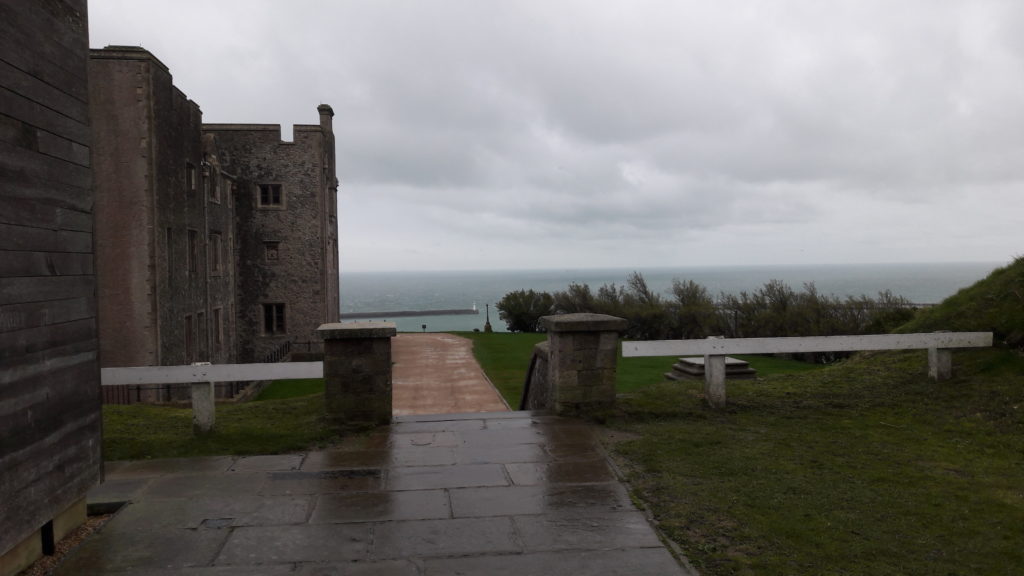
Julian Assange in the Old Bailey on 4 January 2021
Monika Karbowska
The decision delivered on 4 January 2021 in the Old Bailey building in London is known. It is a victory for the European social movements that have been mobilising to free Julian Assange for the past two years, and in particular for the French Yellow Vests movement. But it is also just one step in the war that opposes the people to the pseudo mafia elites who oppress us as much as they imprison Julian Assange. Indeed, we did not fight against the extradition of Julian Assange but FOR HIS LIBERATION. Legally, Julian Assange is a FREE man because he is no longer prosecuted by any jurisdiction. So why didn’t he leave through the front door of the courthouse at 12:25 pm immediately after the verdict was announced? Why is it that on 6 January 2021, after the secret dealings in the Westminster Magistrate Court, he is still not with us enjoying freedom, walking the streets, talking with us and preparing for a long journey to more welcoming skies?
I am going to answer this question with my article while relating the efforts I have made within the Wikijustice association to be always present at all its hearings. The aim is also to make my fellow citizens understand what we are living in Europe and how they must be prepared to fight for their freedom if they want to survive other than as serfs subject to the right of life and death of a mafia power. For we are no different from Julian Assange: prisoner for a year of arbitrary power, we live in our flesh the confinement and deprivation of rights by collective consent.
I had made a trip to Julian Assange’s last hearing to extend his « pre-trial detention » (or according to what Judge Ikram told me on October 29th, « call over hearing » on December 11th, 2020. I had taken advantage of this trip, which allowed me to get some fresh air by leaving France for a few days under an abject police yoke, where even the vital act of breathing was criminalised. I had enjoyed long walks without masks in the districts of Paddington and Islington and above all the joy of seeing life return to a peaceful London, of observing children and teenagers living their lives normally in training to the submission of the gag and the fear of the other. I had been happy to record the scenes of daily life in the reopened pubs and restaurants, the music, the encounters, the joy of life returning. I had even published and transmitted these images to friendly restaurateurs in France in order to incite them to fight for their reopening.
I had learned a lot from this trip and I wanted to share this information with my fellow citizens. Unfortunately the political power intensified its dictatorial pressure on us as the festivities approached and I had to participate in the finalisation of the International Wikijustice Complaint which became our main tool in the legal fight. Also working as a proletarian to provide for myself, I only had the time and strength to write my article. So I will include some information in this story so that it is clear what is at stake for ALL of US in the struggle for the liberation of Julian Assange.
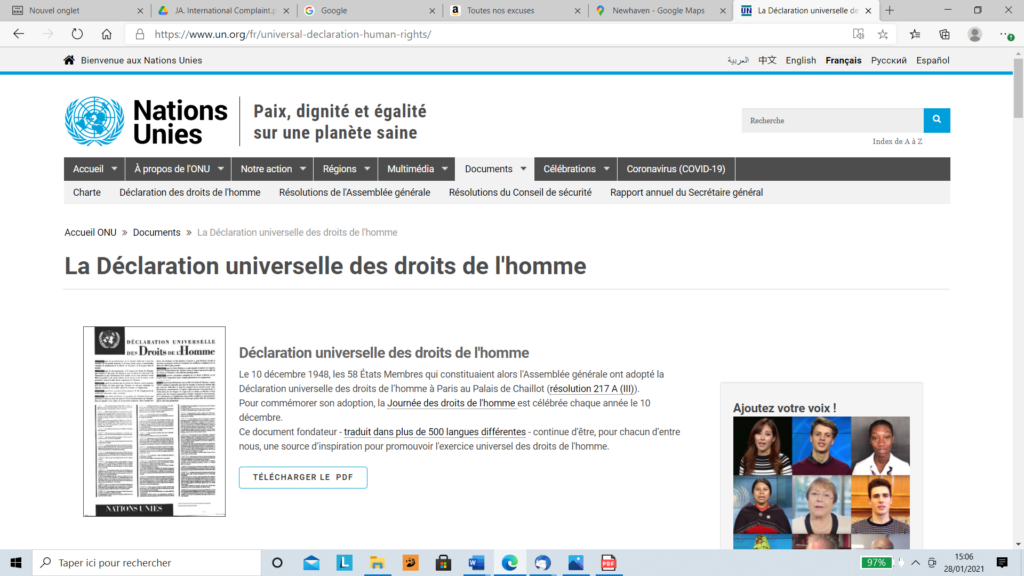
Travelling, Sovereignty and Fundamental Rights
I don’t understand why so many people around me in Western Europe are convinced that it is now forbidden to travel and that « the borders are closed ». The good news is that no, the borders are NOT closed and it is still as it was before March 11th « allowed » to travel. The bad news is that so many people don’t understand what their rights and freedoms are, being convinced that when five guys on television say something, not only is it true, but miraculously it becomes law. No, what the guys say on TV and even if their name is Macron, it does not have the force of Law and is not a REGULATION of our society.
Our society is based on a corpus of Laws whose hierarchy is established as follows: first at the top are the Fundamental Natural and Inalienable Rights guaranteed by International Texts including the United Nations Charter and the Universal Declaration of Human Rights and all the Human Rights Covenants in the custody of the UN. The right to liberty, life, security, inviolability of the home, privacy and the prohibition of torture are the fundamental rights that everyone should have in their heart and brain when they hear a man on TV telling him that « the state of health emergency forbids you to leave the house and that the police can come and check how many people are at the table ». These so-called « Covid measures » are simply forbidden by law and are therefore serious violations of the Universal Declaration of Human Rights.
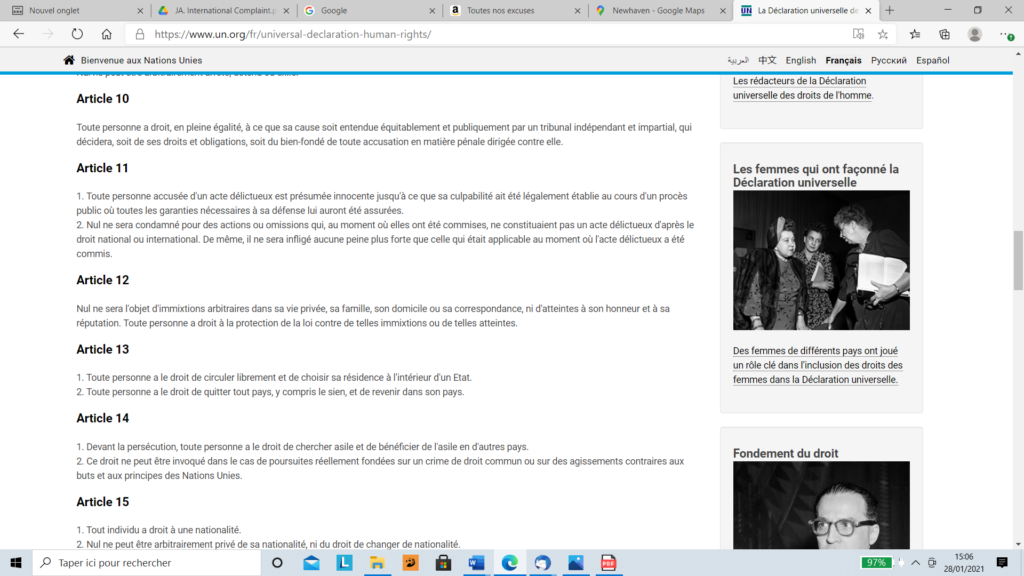
The UDHR also states in Article 13 that « everyone has the right to leave any country, including his own, and to return to his country »[1]. This is the basis of the « right to travel ». Naturally, the second floor of the Corpus is our Constitution, the foundation and most important part of which is the Declaration of the Rights of Man and of the Citizen of 1789 as well as the Preamble of the Constitution of 1946 which is part of the Constitution of 1958[2]. This « old text », as an unwise Internet user would say, is the basis for the fact that we do not need the authorisation of Castex or Macron to have the right to live. Article 2: « The aim of all political associations is the conservation of natural and imprescriptible human rights. These rights are liberty, property, security, and resistance to oppression ». Keep this in mind when Castex tells you on TV that the coronavirus forbids you to cross the threshold of your house, to walk in the street or to breathe without a gag. So our Constitution begins like this: « In the aftermath of the victory won by the free peoples over the regimes that tried to enslave and degrade the human person, the French people once again proclaim that every human being, without distinction of race, religion or belief, possesses inalienable and sacred rights. It solemnly reaffirms the rights and freedoms of man and citizen enshrined in the Declaration of Rights of 1789 and the fundamental principles recognised by the laws of the Republic ».
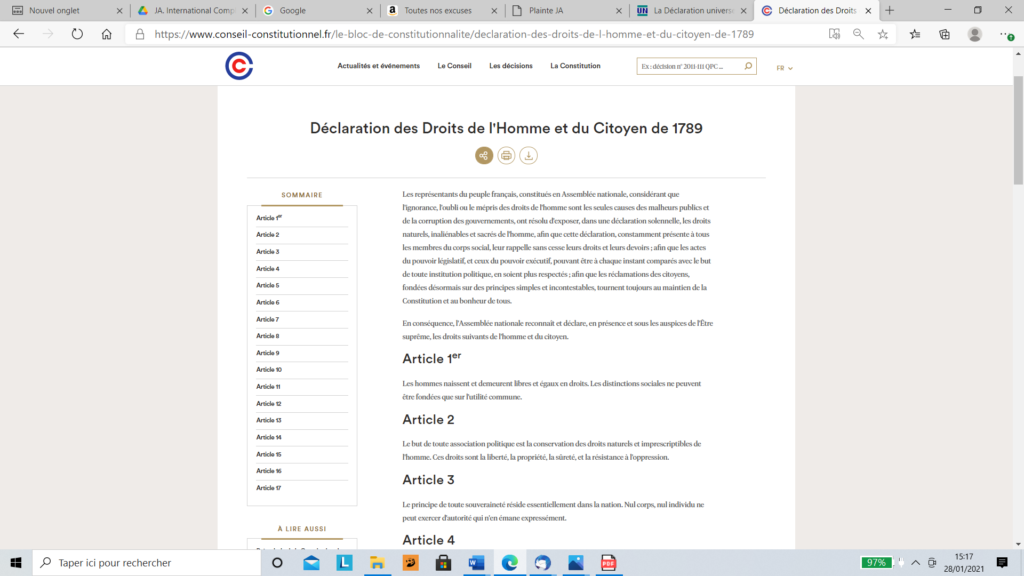
On this basis, all laws, decrees and ministerial circulars must be in accordance with the Constitution and if they are not or if their interpretation is not clear, it is always the « inalienable and sacred rights » that prevail. There is no « health emergency » or other « emergency » that limits Fundamental Rights by any ministerial circular or « law of exception » issued as a matter of urgency by 5 individuals in an empty National Assembly. There is NO state of health emergency provided for in our Constitution. How many times must this be repeated? On this basis, and since the government knows very well that it is breaking the law, an arrest of someone who wants to « leave his country » is an arbitrary arrest. Likewise, the government has no right to prevent a citizen from returning to his or her country of nationality. To do so is a serious abuse, a very serious abuse of right. Banishment no longer exists in our civilization since the modern state was constituted as a Sovereign. Both banishment and arbitrary arrest are instruments of Tyranny, which is prohibited by Our Constitution. Resistance to Tyranny is provided for both in Our Constitution and in the Universal Declaration of Human Rights.
The sovereign state was hardly constituted on the basis of the definition of a single power over a territory defined by borders. It was the Peace of Westphalia of 1648 that established the legal premises of territory and borders. Sovereignty is from it defined as power over a territory to the exclusion of power of others over these territories. Clearly, states undertake not to interfere in the affairs of the other, to sow disorder, to pay internal enemies to destroy the internal neighbour[3]. Since the Revolutions of 1789 and the difficult struggle for Democracy and the Republic, it is the people who decide on their sovereignty and manage their territory » Constitution of 4 October 1958: « Title I – OF SOUVERAIGNETY ARTICLE 2. The motto of the Republic is « Liberty, Equality, Fraternity ». Its principle is: government of the people, by the people and for the people ».
A State is sovereign over its territory, which is delimited by borders. This sovereignty and these borders are valid if they are recognised by its peers, the other States. This is the foundation of RECIPROCITY, the basis of international law and the functioning of diplomacy. This is why international recognition by OTHER States is so important when a Nation wishes to create a State and creates, accedes to or wrenches its independence. Today it is adherence to the United Nations system and Charter that guarantees this independence and gives the Citizens of that State the security that their fundamental rights will be respected by their fellow human beings, the other humans in the world organised in the system. This is why borders are NOT a travel ban and not even an obstacle to cross. The borders of my state are also the borders of my neighbour, so I have to make sure that my state gets along with its neighbour so that I can travel to its neighbour. In accordance with the principle of reciprocal recognition, the rules for crossing borders must be clearly established, valid for everyone and identical for the citizens of both States. For hundreds of years, states have regulated their relations by bilateral treaties which have the force of law in their respective territories. These treaties are valid as long as other treaties have not replaced them (in the same way that a 200 year old Constitution is still valid even in the age of RNA vaccines and mobile tracing if it has not been replaced by another one).
Why am I writing this, which looks like a civic education course for 12-year-olds? Because I see that my contemporary fellow citizens have forgotten all about these basics or even never knew anything about them, convinced that Macron has the right of life and death over them or that the European Union has « given them the right to travel » and that now it is taking it away from them by the virtue of Véran’s decisions, so they must « stay at home ». « How could you go to Poland? I was asked half outraged half admiring in November. « Everyone has the right to leave their country, including their own, and return to it » – so I took the plane and then the bus back. In the same way the « Brexit » is not the « apocalyptic catastrophe » that uncultured storytellers repeat and sow the seeds of lies. Great Britain applies the bilateral treaties that it has signed throughout its existence and which have never ceased to be valid even when the European Union claimed to cap national jurisprudence with a hat of « universal supranationality », which in reality is illegal. The European Union is in reality only an International Treaty between 27 States – currently the Treaty of Lisbon. Moreover, what does Article 2 say? « The Union shall provide its citizens with an area of freedom, security and justice without internal borders, in which the free movement of persons is ensured. The Treaty of Lisbon is still valid and no coronavirus has the power to suspend it. The right to move within the EU is still valid, that’s why I went to Poland and came back.
And this is why I was able to go to Great Britain from 10 to 14 December 2020. After 1 January 2021 Great Britain and France returned to regulating traffic between neighbouring countries on the basis of a bilateral treaty. I invite everyone to read in the Official Journal the number of old bilateral treaties still in force: they are innumerable and regulate the circulation of goods and persons, as well as the rights of students, workers, social security equivalence, pension payments… it is a mine of very reassuring information which shows us that the « New World » of the neo-liberals is a cult myth: the world is still based on legal regulations and/or ancient or modern traditions but still valid as long as they are not denounced or cancelled. Don’t listen to the TV that makes you « seltzer water of our brain » (as we say in Polish). In this case it is important to refer directly to the legal texts and it is very damaging and abusive that France has not published the agreement it signed with Great Britain on 24 December 2020 after its blockade of the port of Dover. The era of secret treaties should be over!
[1] https://www.un.org/fr/universal-declaration-human-rights/
[2] Déclaration des Droits de l’Homme et du Citoyen de 1789 – Légifrance (legifrance.gouv.fr)
[3] https://mjp.univ-perp.fr/traites/1648westphalie.htm
Crossing borders against fear on 10 December 2020
Perhaps it is because I am the daughter of a diplomat from communist Poland that I know that borders are meant to be crossed – legally. My father issued Polish visas for 42 years and he never thought that a visa could be an obstacle to come somewhere, on the contrary, according to consular law it is ONE RIGHT to come, to cross a border. In the 80s when I was a teenager every state in Europe had its borders. Each State had signed a multitude of bilateral treaties with all the States of our continent, which effectively formed a single civilisation. The most visible border was the border between the two systems, communist and capitalist, materialised by the Wall separating West Germany and the German Democratic Republic and surrounding the West Berlin enclave inside the GDR. But this border was by no means a mythical iron curtain, it was francissable and crossed on a daily basis. Tourists, professionals, students and truck drivers applied for short- and long-stay visas and travelled by train, plane and car in tens of thousands of individual travellers between East, West, North and South. Western European countries started to abolish visas among themselves to facilitate the tourist industry in the early 1980s, Eastern European countries maintained visas BETWEEN THEM, but these visas were only formalities and were granted by state travel agencies that organised and facilitated travel. Poles, Germans and Hungarians travelled to Yugoslavia and Bulgaria for the Mediterranean sunshine, while citizens of these countries came to ski in winter or visit Polish cities. The integration movement was also continuing here through bilateral regulation. In 1988 a Pole could travel without a visa to Greece and Austria to West Berlin, GDR, Hungary, Czechoslovakia, Yugoslavia for a short stay and they did not refrain from doing so. What was at stake was rather to force our state to grant us a passport « at home », whereas the communist system wanted to reserve the right to grant or refuse the right to a passport, and therefore to leave or return to its citizen. The first thing I did when I turned 18 in March 1989 was to ask for my passport and « keep it at home ».
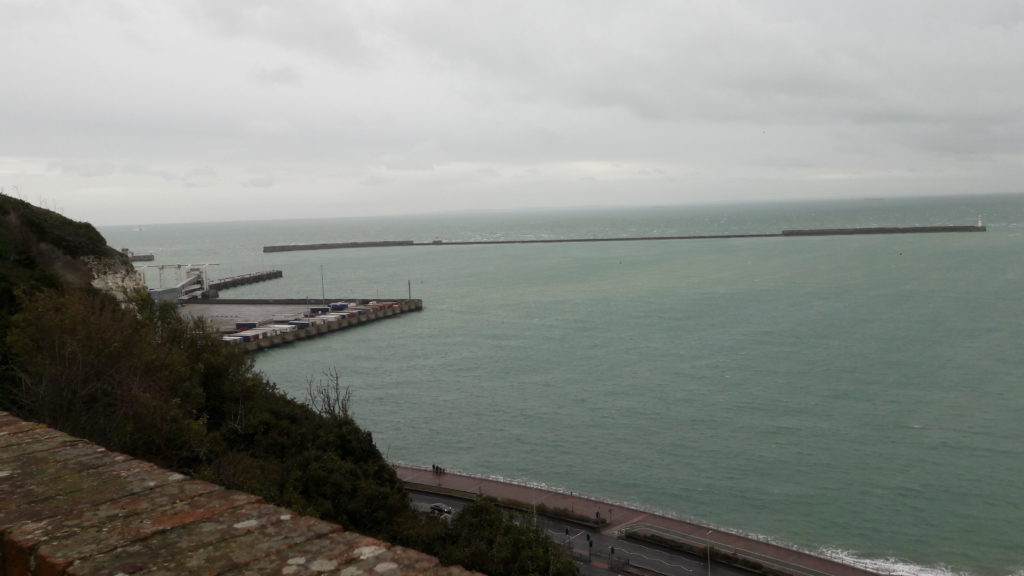
Since then, I have crossed many borders, since Western Europe was a very difficult border for Eastern Europeans to cross until 1992, when the additional Schengen protocol was signed. From 1989 to 1992 a Pole had to prove that he had 500 FF (80 Euros) per day for just a 10-day tourist stay in France, a certificate of accommodation signed by a Frenchman and watch out for him if he exceeded his stay in France by one day: he risked having a no-stay stamp in his passport when he left the country! These were the conditions under which I came to France in 1992, like so many other Eastern Europeans, and we didn’t complain about them: it seemed natural to us that a sovereign state should control its borders. However, we would have liked the rule of reciprocity to apply to French nationals as well. But our countries were weak, on the verge of being colonised, and distributed residence permits generously to French nationals, whereas France refused our requests for long-stay visas and distributed « OQTFs » (deportation order – obligation to leave the territory) in response to our requests, rather than « carte de séjour », « permit to stay », until 2005. I know what I’m talking about, I was a foreign student with a residence permit without rights and precarious, then without papers, from 1992 to 2001
For me the way I can cross a border is the barometer of the real state of relations between the two neighbouring states. This is why it is important to turn off your TV and take the plane, train, bus, car and bicycle and go and test the reality on the ground, the reality of political relations. On 10 December 2020 I tested Franco-British relations by taking Charles de Gaulle’s plane to London. The airport was totally disorganised by the multitudes of people wanting to leave our country when entire terminals had been put out of use and the RER B, so crowded as normal, was deserted. It must be said that the air became unbreathable in our country with these « confinements », « prohibition to go out without aussweis » and « obligatory mask everywhere, for everyone and in all times ». The British Airways check-in counter was full of distinguished and rather elderly Englishmen who had chosen our country as their home for its lifestyle and social security… Both died. Hospitals are now mortuary places that anyone over 55 must avoid if they are ill, otherwise they risk « covid » isolation and sudden death without their loved ones being able to defend them. As for the art of living, you know what is happening in our empty, desertified cities with the brutal and abusive closure of cafés, restaurants, places of culture, associations, public meetings, places of worship, political parties, etc. etc. The list of prohibitions is as long as the day without bread of the serf before 1789.
The old English returned to their country loaded with heavy luggage, whereas young French took the plane for Asia, the place of the future where moreover one does not wear a mask everywhere, with all due respect to our friends on the left who think they are « more Chinese than the Chinese » by imposing the fashionable muzzle on us. The plane was full but the trip was very short and pleasant, I could see the mainland finishing, the grey inlet was spreading out for 10 minutes and here we were already landing in the fog at Heathrow after flying over Windsor Castle which is actually next to the international airport. The airport seemed huge to me, as big as the one in Beijing, quite luxurious. The rich or upper-middle class globalist public of the Commonwealth reminded me how much for a year now I have been living with the poorest classes, migrant workers in the Flixbus, migrants are Europeans who can be judged in this « Westminster Magistrate Court » where Assange is « judged » as a public of marginalised and homeless people living in the hostels in the surrounding district and often coming to the « demonstrations » in support of Assange. I was particularly displeased to see a very classy young man forcing a mask on their 2-3 year old child, they wore the tool on their own faces so proudly that it looked like social status again, an advertisement shouting « look, we are the new corona world ». But the real Franco-British border was actually very welcoming. The man in border police uniform was unmasked in his stall. He replied to my smile and asked me when he took my passport why I didn’t register at the automatic control reserved for « European nationals ». I answered spontaneously « Because I prefer humans to machines »! No further questions. He wished me a very pleasant stay!
Living Freedom in London in December 2020
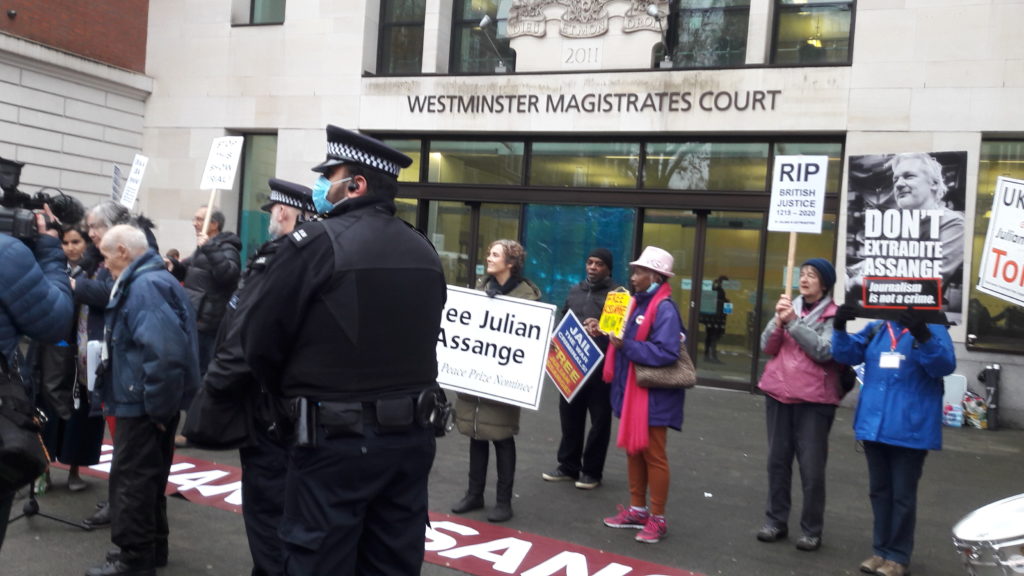
This beautiful welcome gave me a lot of happiness and courage! As soon as I got off the metro and having easily integrated a beautiful hotel in Paddington, I threw the gag mask on and went out for a very long walk with my nose to the wind north of Paddington – Abbey Road with the famous studios, Finchley Road with the small houses including Freud’s House and the Tavistock and Portman Center… I photographed and filmed the pubs and restaurants open to show that we lived normally here and that nobody was afraid of a covid. In a pub near Finchley Road I enjoyed my cocktail like a prison escapee and with permission I photographed the joie de vivre of the young people chatting there. The next day I was at 6am first thing in the morning outside the door of the Westminster Magistrate Court, tired but finally confident. Julian Assange still has to report to the remand centre, you have to be there, always, without exception, to show that you don’t give up.
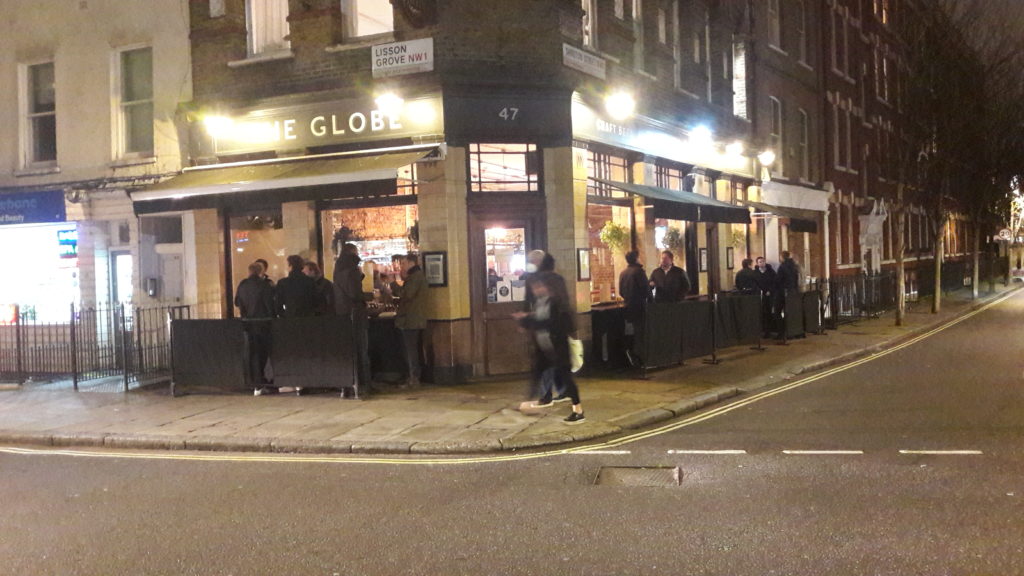
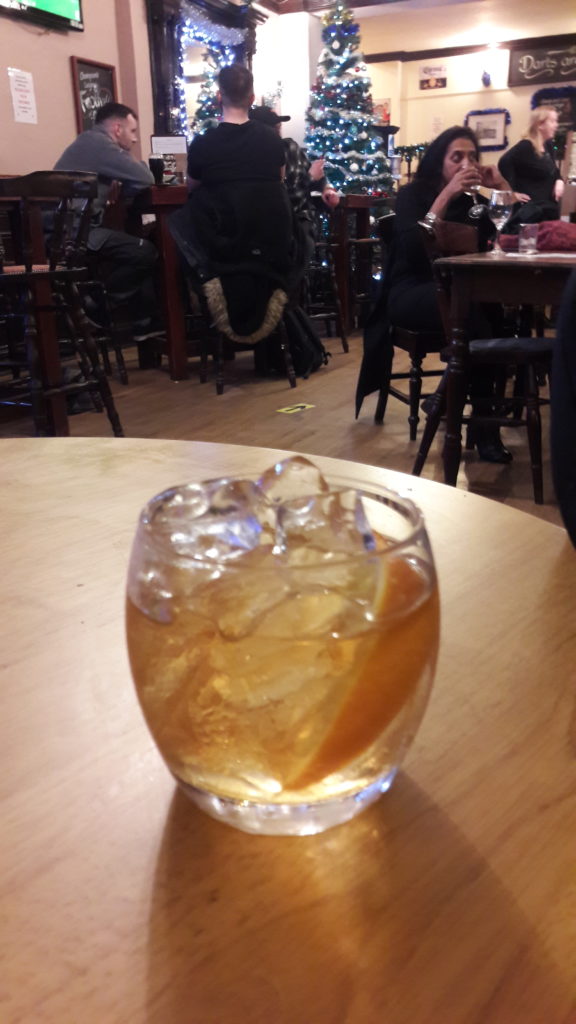
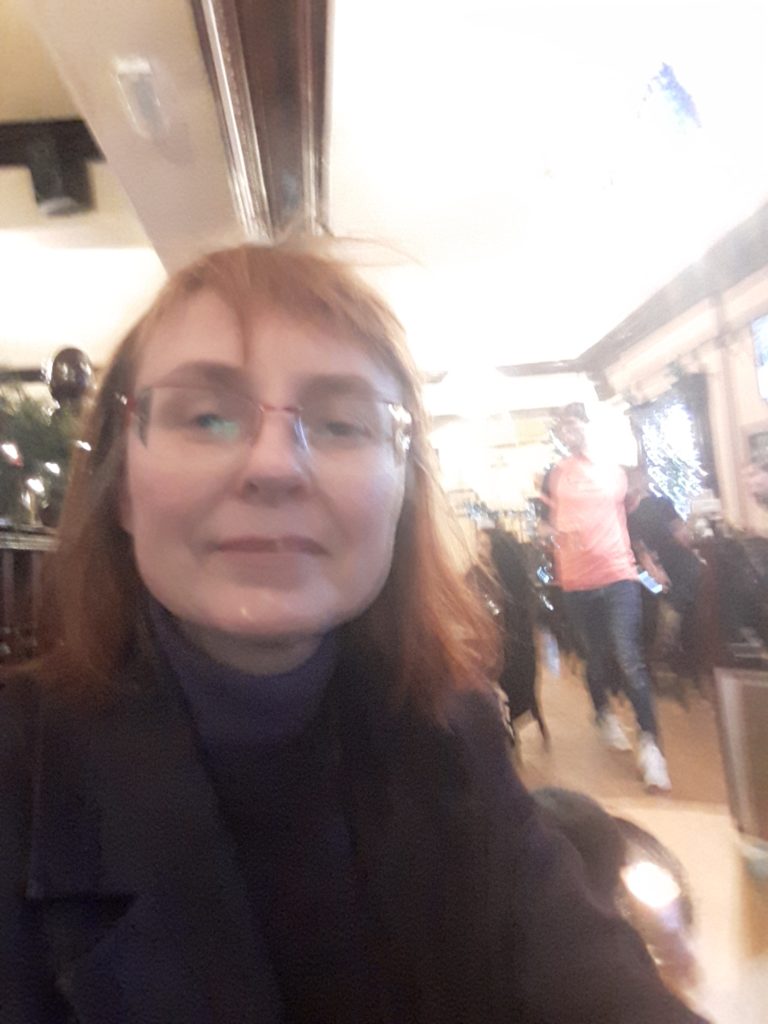
The next day, after Julian’s failure to appear but the appearance of a new judge, Judge Paul Goldspring, I still managed to go for a very long walk in the Islington area of North London. I wanted at all costs to walk a long way to enjoy the air without masks and the happiness of people to live normally. In this area live the Bobo middle classes but also the working classes of migrant origin in pretty brick blocks of flats in gardens. It is like a kind of Montreuil. I used to see young British people in groups in the pedestrian zone meeting up, kissing and laughing, then eating at the kébab together, then dancing in the street and chatting while listening to music at full speed…. I saw the children playing merrily everywhere, the parents walking around chatting and preparing Christmas shopping…. And I thought of the French children suffocating under the mask 10 hours a day… the youngsters languishing locked up at home without any contact that the computer…
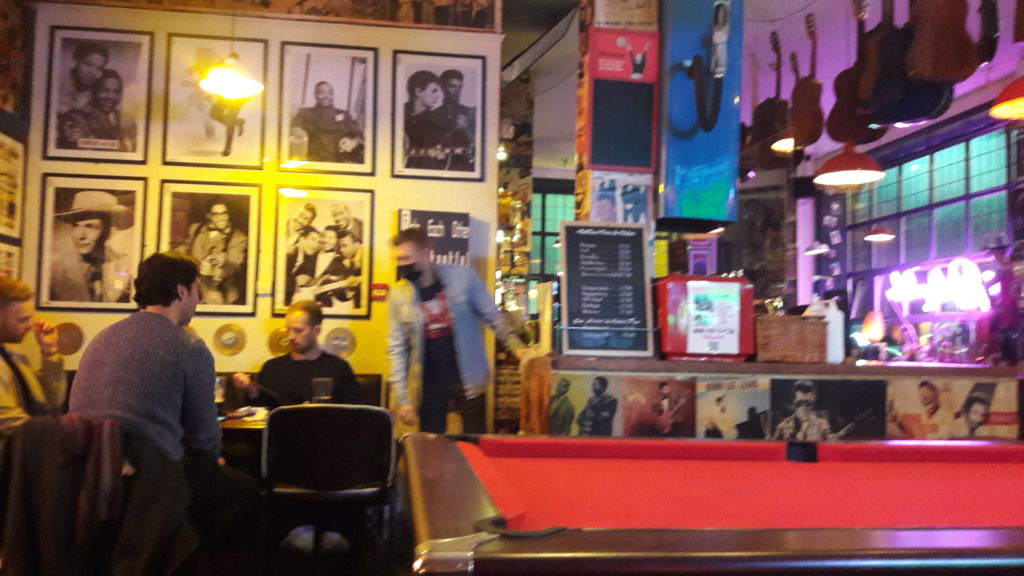
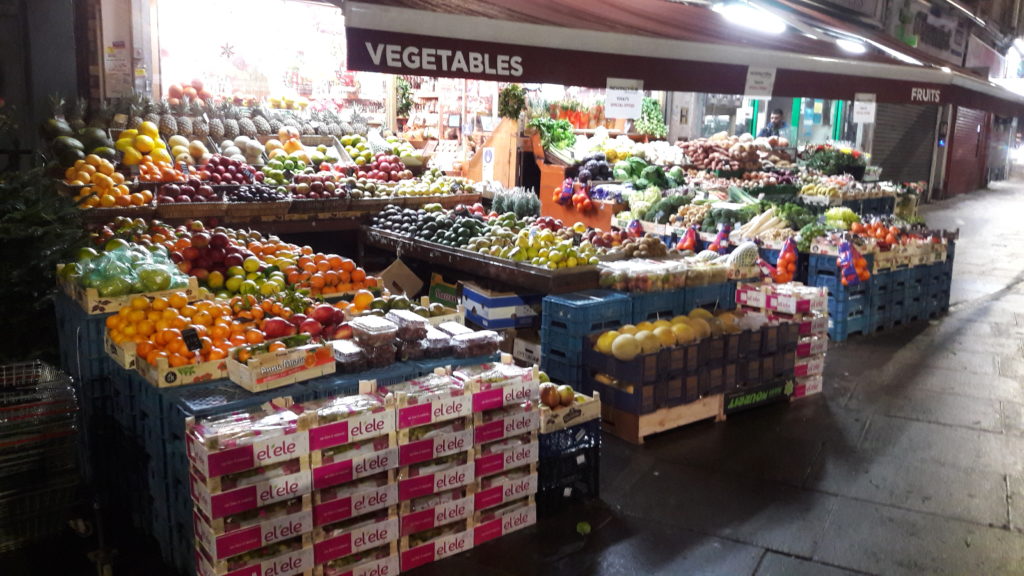
I still cannot believe my eyes that we accept such tyranny and destruction of the Nation, of the People, of our FUTURE without thinking. In the land of Human Rights, the lives of children are being destroyed with relentless determination… In a modest neighbourhood pub I spent euphoric moments drinking a simple beer, listening to music and watching young people play billiards. In London on that day, December 12th, I felt Freedom like I haven’t felt it since 1991. And I understood once again that Freedom has always been my primary driving force. Freedom not to be locked up in my father’s house, freedom not to be locked up by a system. The freedom not to be poor and deprived of rights. The freedom to live with dignity. All those who are astonished that I am today against the covid dictatorship and that I do not consider the Chinese regime as our model (it is another question of knowing if « the Chinese regime » is indeed the one presented to us…) have misunderstood the deep meaning of my action and my political choices. Freedom is the condition for all political action. Without it we do not even choose the struggle for Justice. Without it we are no longer human beings.
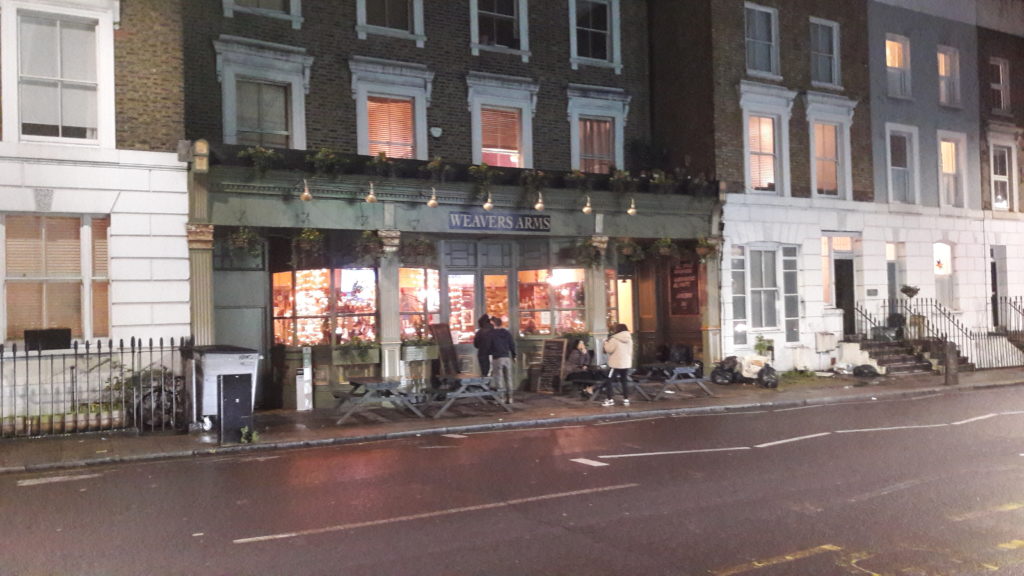
While the police in France were ruthlessly hitting citizens in the street who had become serfs in their own country, I witnessed a scene that moved me with joy: at a crossroads, a crashed car was stopped in the middle of the street, behind it a municipal police car. Instinctively I tried to flee, as I do now in my home town of Paris, as soon as I saw a police uniform in the distance. Then I reasoned: no mask is compulsory, I have no reason to feel guilty. I approached to cross the street. And now I see that the perpetrator of the accident is a tall, totally drunk man who babbled in approximate English with a strong Ukrainian accent: « I assure you, Madam, that I am guilty, yes! I must never drink again! You were right to stop me! Take me to jail! I love my wife and children but I must stop drinking! « And then I see the young blonde policewoman holding the tall man by the arm and gently saying to him « don’t worry, we’re not going to take you to prison, but to the hospital where you’ll be treated », while her two colleagues were calmly discussing how they were going to get the car off the road. It was Friday evening, the man was drunk and dead, he had had an accident and he wasn’t afraid of the cops! If last wave migrants have such faith in the justice of the British police system, then yes, this country has a future! And will be able to rebuild a sovereignty!
Certainly, it was Islington and central London, Charing Cross station where I took the train to Dover was already another policy because obviously another municipality: even if the shops were open and the crowds were dense for Christmas shopping, the mask was severely imposed at the station and in the shops, while the big chains owning the restaurants imposed tracing by application. Not wanting the Imperial College of London managing the NHA to know where I eat and where I go to the toilet, I sat on the floor like in Paris with a coffee to go. Then I took the train and arrived in less than two hours in the small town of Dover at my small, cosy hotel in front of the station.
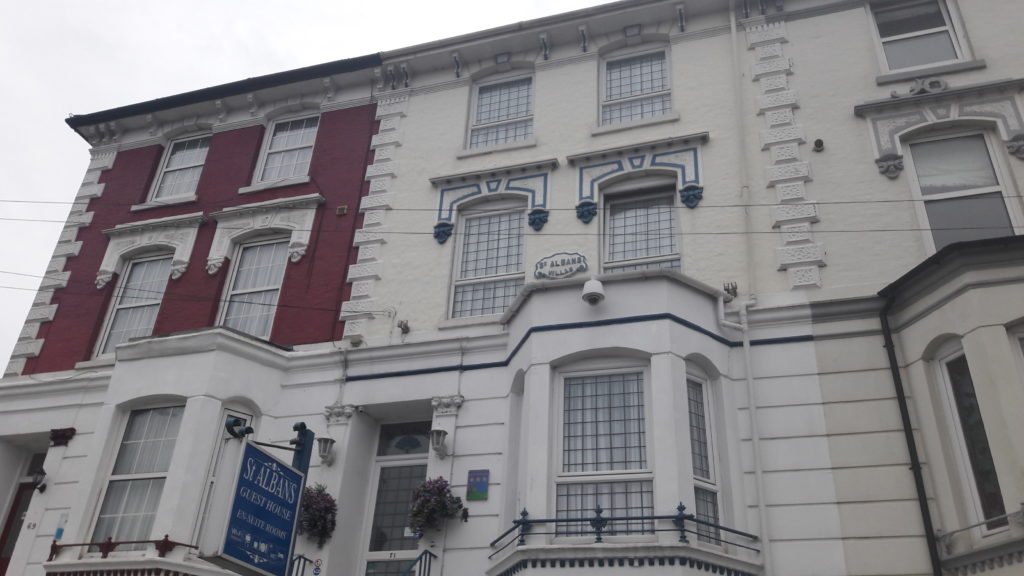
Dover or the oppression of the poor
But after that it was a different story: I went out in the evening to Dover and walked towards the city centre, the imposing castle of Henri Plantagenet, the seafront and found the city unusually quiet and deserted for a Saturday evening. I found an Indian restaurant open and went in. In a small hallway a man explained to me that the « corona » state had been declared in the area and that therefore only take-away sales were allowed. The man sold the food to me at a high price and again he made me wait outside in the cold as if my presence alone brought the plague to his establishment. I wanted to plant it there but there was nothing else to eat in the town and all the other pubs and restaurants were closed. On my way back I came across the police for the third time as they were touring the small town. I lengthened my stride to lock myself up in the hotel, rediscovering my reflexes of France under dictatorship: find or hide, building site or bush so as not to have to risk the arbitrary violence of the cops. Because yes, I know how to cross borders but I am like everyone else when faced with violence from the cops: I am afraid and I try to avoid it. What I would like is NOT TO HAVE TO BE FEAR OF THEM. It’s to live in a democracy where the cops respect my rights and the Laws. Suddenly around midnight, while the streets remained deserted, cars converged on the countryside to what must have been private parties in the houses… Good thing that the youth is having fun, in this world of bullies, we need to LIVE!
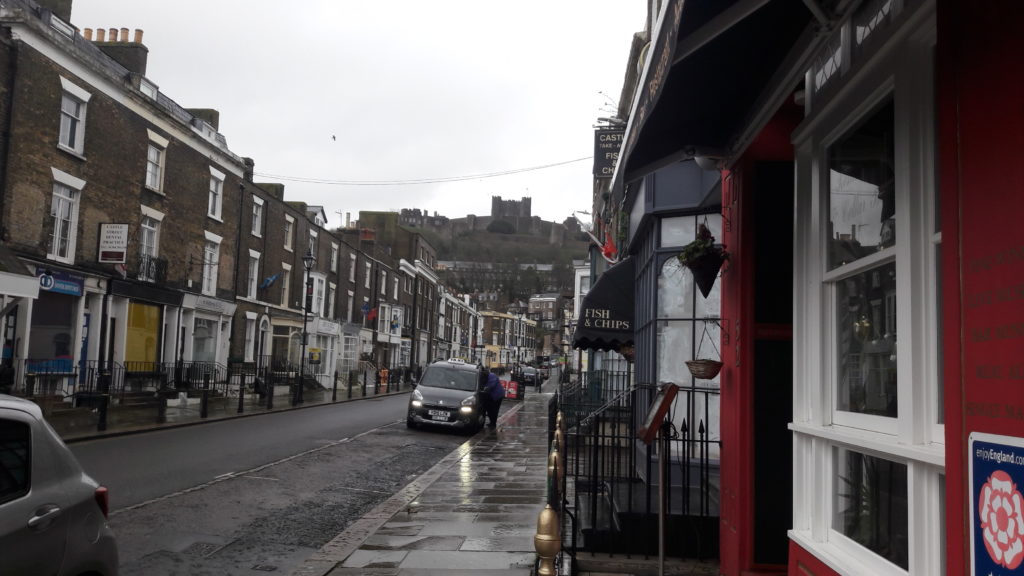
The next day I had to face the famous lockdown in the Kent region: in the centre of Dover there was still a bookshop, a toy shop, a souvenir shop open but the owners didn’t know what to do with their goods, only the poor man’s 1 pound supermarkets were making money. I found a small café that made good british breakfasts and was happy to talk to the owner a very friendly Indian coffeshop owner who also allowed me to use his toilet. For him as for everyone else, the covid is pure political bullshit with which the rich cheat and still oppress the poor. But he blamed the British government as a whole without being able to explain the role of the municipality of Dover, which, led by very covidian Labour, adds bans, regulations and police threats to a small town that needs tourism to survive. Covid propaganda was omnipresent in Dover in the form of posters and illuminated signs, while in Paddington and Islington in London at the same time there were no masks in many shops! The man believed as strongly that the vaccine would stop the madness and I could not warn him against a belief that would no doubt hold him. He even allowed me to sit down and welcomed in his shop an old neighbour who had just come to talk to him… Coffee is used to meet, not just to warm up in winter and consume… That’s why the Covidian sect wants to destroy the notion of a meeting place…
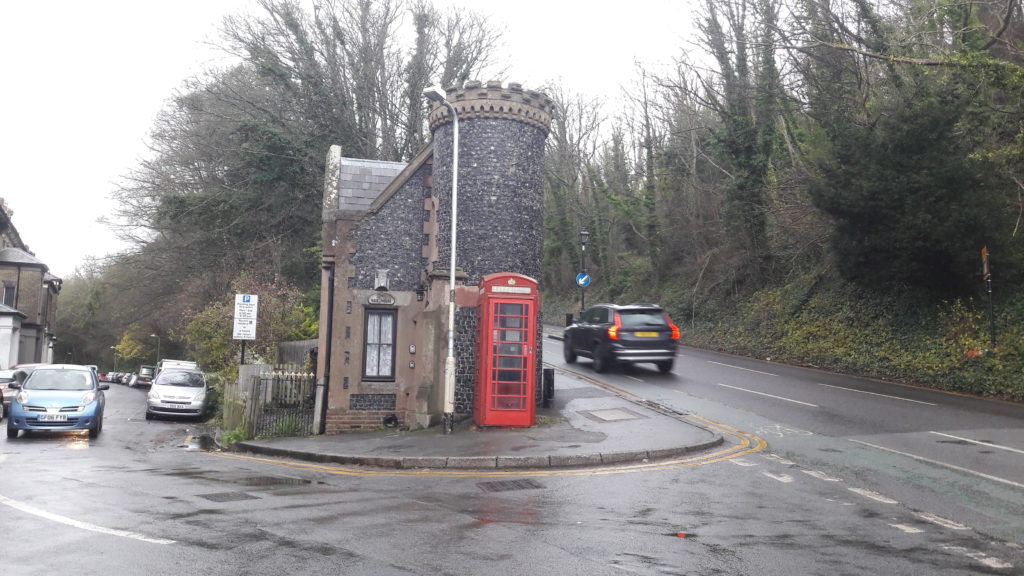
After having had breakfast on a bench in the rain, I ended up going up to visit the superb Chateau des Plantagenets, built in the time of the Normans to protect themselves from France! The castle has always been the « guardian of England » and its fortifications were used against Napoleon’s blockade and the first cross-channel bombs of the German « Big Bertha » that managed to reach the island were improved or sent back to the mainland. The castle of Dover is also known to have been the headquarters of the British army’s operation to reembark from the beaches of Dunkirk in a France that was in disarray in July 1940. This masterful operation, considered a victory by the British (and a defeat by France, whose soldiers were nevertheless able to avoid captivity by being evacuated to England by the flotilla of « little ships », the fishing and trading boats that took part in the operation…) was organised and directed from the headquarters located in an underground passage inside the cliff below the castle. The underground, which has an equipped hospital, can normally be visited, from the headquarters you can see the French coast and the port, below, you can see the windows and air vents of the military installations in the cliff. I contemplate the magnificent view towards France behind the busiest arm of the sea in the world and I regret not being able to visit the underground, which is a landmark in the history of the heroic struggles against the Nazis.
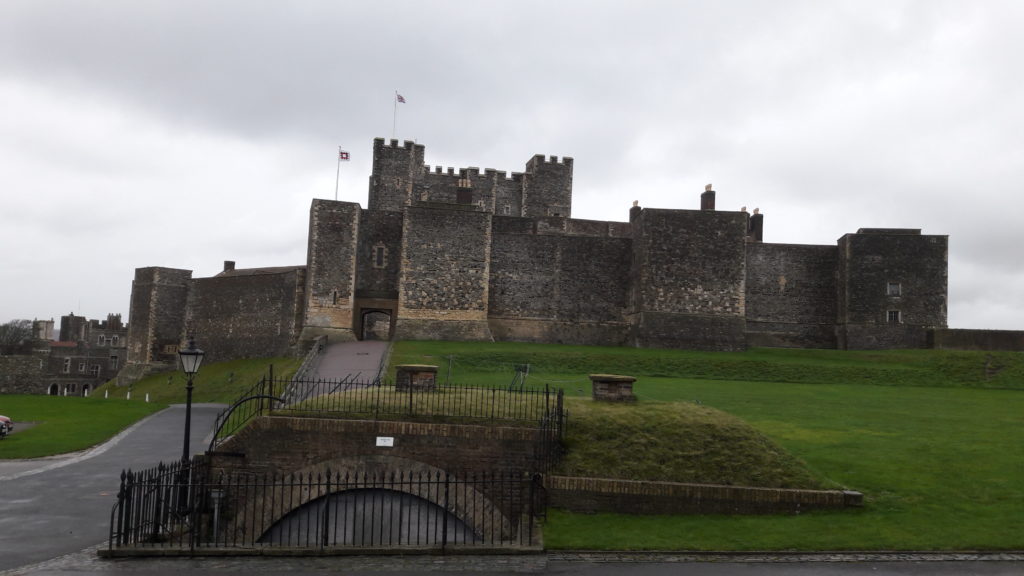
The covid madness prevents travel, tourism, knowledge, closes museums and libraries. I am the only tourist, some other inhabitants walk their dogs on the castle site. The employees are obliged to register on an electronic register in order to trace me in case of a covid, they do their job of tracing but do not hide the fact that they would all like to return to a normal life.
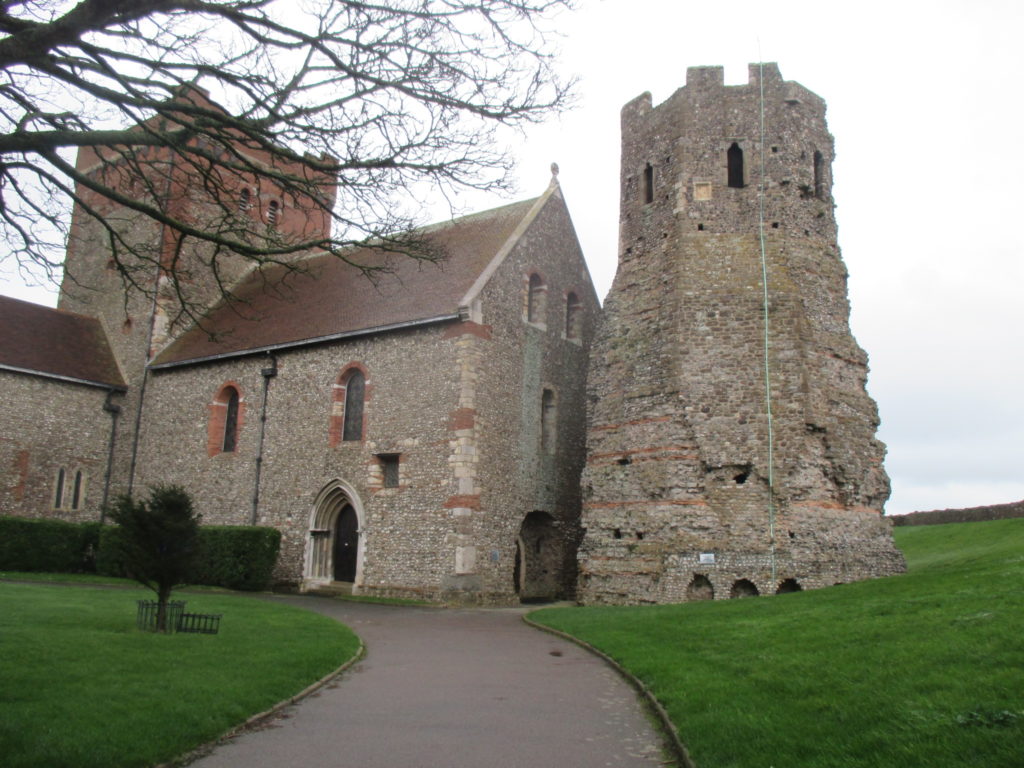
What I remember is that the Gothic castle of Henry II Plantagenet is as much a guardian lighthouse as a bridge to the continent (moreover, the oldest part of the castle is a magnificent Roman lighthouse which is very well preserved), France and England do indeed have a common history and civilisation and the Dover crossing is only closed in times of war.
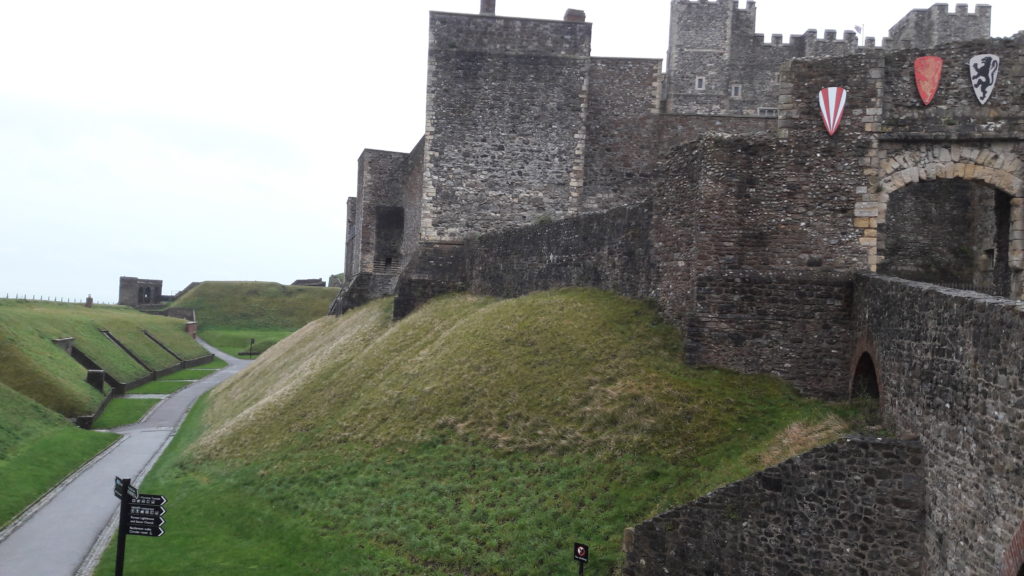
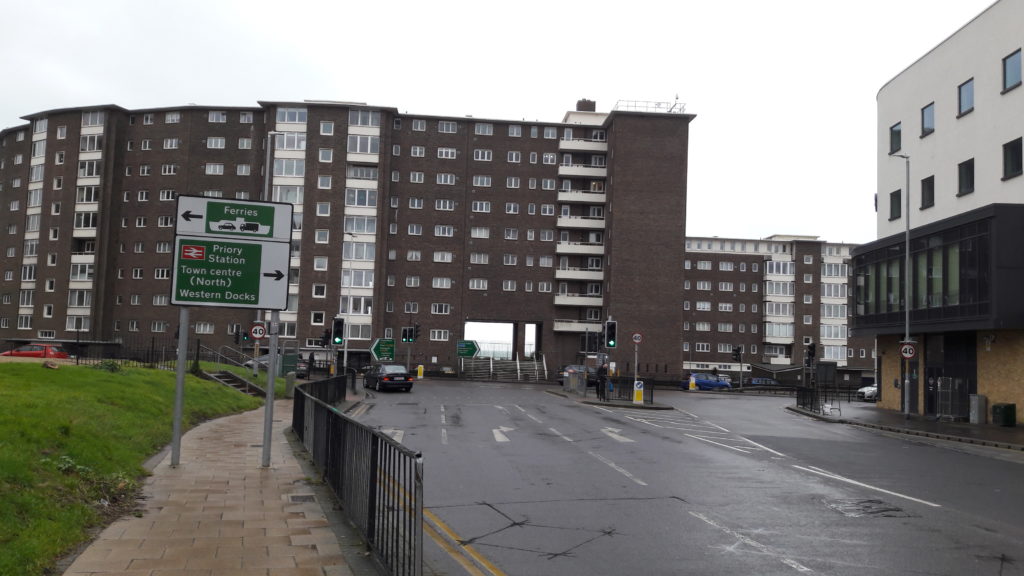
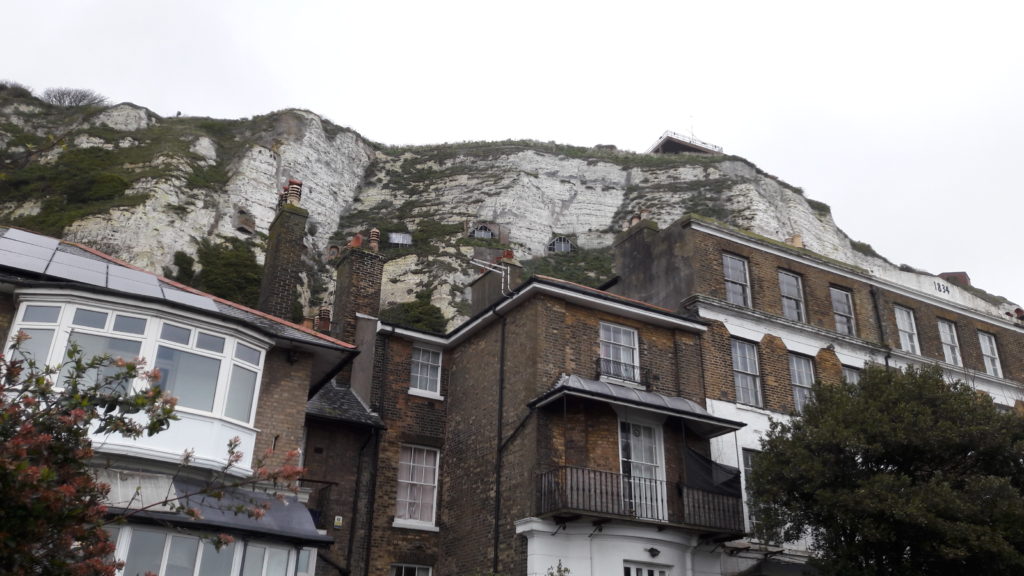
I walk down gently from the cliff to the gate below. I walk along a series of high brick blocks of flats overlooking the waterfront, an interesting example of innovative social architecture after the war. An armada of lorries passes me and rushes towards the ferries already waiting at the quay. To my left the small houses blocked under the spectacular cliff, to my right the sea.
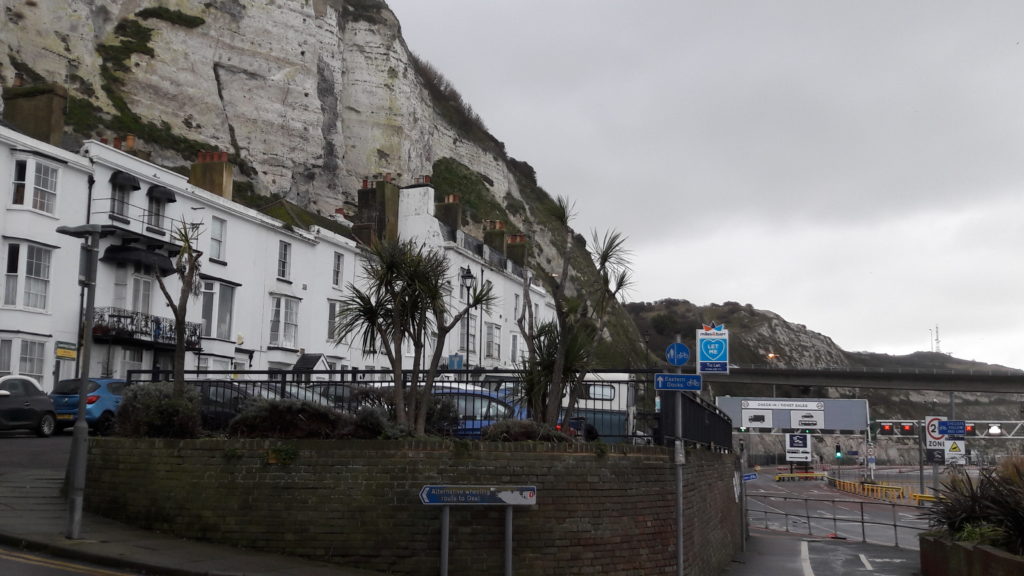
I arrive at the Port Authority building, which is also the ferry terminal. A sign indicates to the cyclists that they must continue on foot to enter the boat. The station is a large hall under the « foot passanger » sign, with a closed café, toilets and offices. It is deserted except for one man alone behind a ticket office. I show him my paid ticket on the internet. He asks me why I don’t have a car. I’m taken aback, I tell him that I’m a « football passanger ». Of course, when I took the ticket on the internet, it drew my attention to the fact that it was compulsory to indicate a car, a truck or a bicycle but I thought that the company just wanted to make more money, so I ticked « bicycle », telling myself that cycling or walking is the same after all you are obliged to leave your bicycle in the hold and you go up to the passenger part on foot! But now the man refuses me access ! He tells me that without a bike I’m not allowed to get on the boat ! That with a bike I don’t have the covid, but if I don’t have a bike I’m going to bring them the covid !
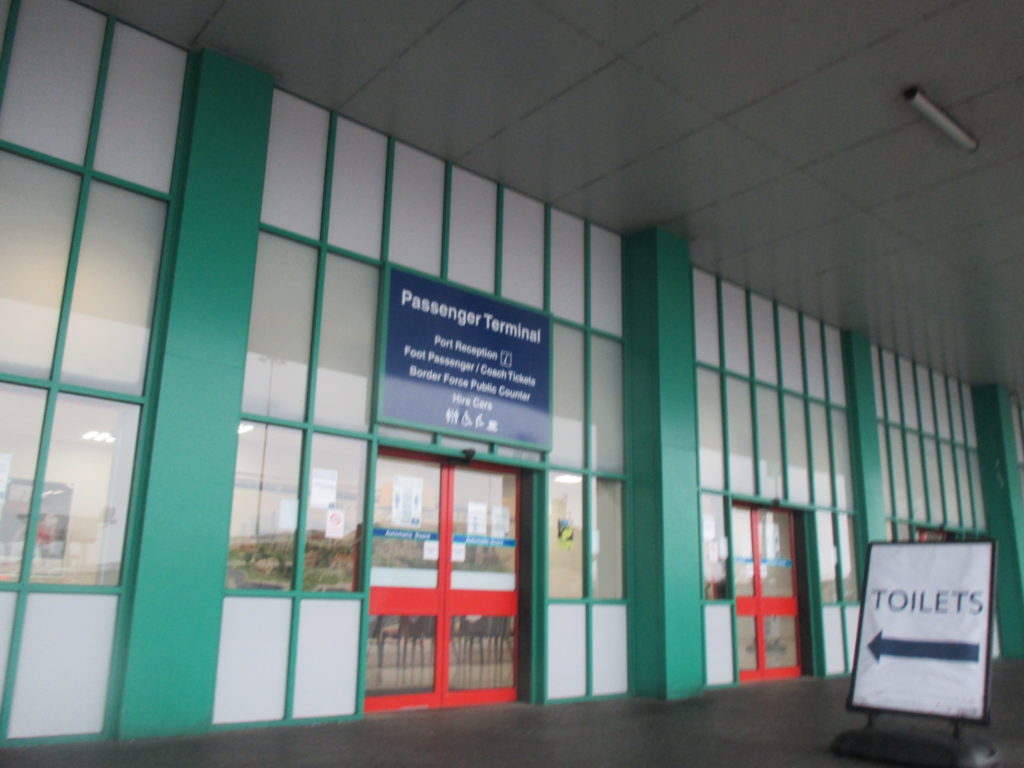
This seems totally absurd and I try to reason with him logically. What’s the importance of having a bike since anyway, as it says on the sign opposite « cyclist, get off your bike and walk to the 2 ferry bridge »? I get angry that I paid for the ticket, that they don’t give me the money back… I despair how I’m going to get home. I ask him, but who made such absurd rules, of which you are not warned anywhere because the « foot passanger » sign is always in a good place above the station entrance? The man refuses to talk to me, he doesn’t want to give me a phone number of a superior, he obviously sends me back to the internet (refer to internet sites where there is no valid information, the best parade of small chefs anno domini 2020). The only information I managed to get out of him is that it was the ferry company, DFDS, that took the decision to ban foot passengers and that this absurd ban has been in force since last March, the first lockdown covid and has never been lifted.
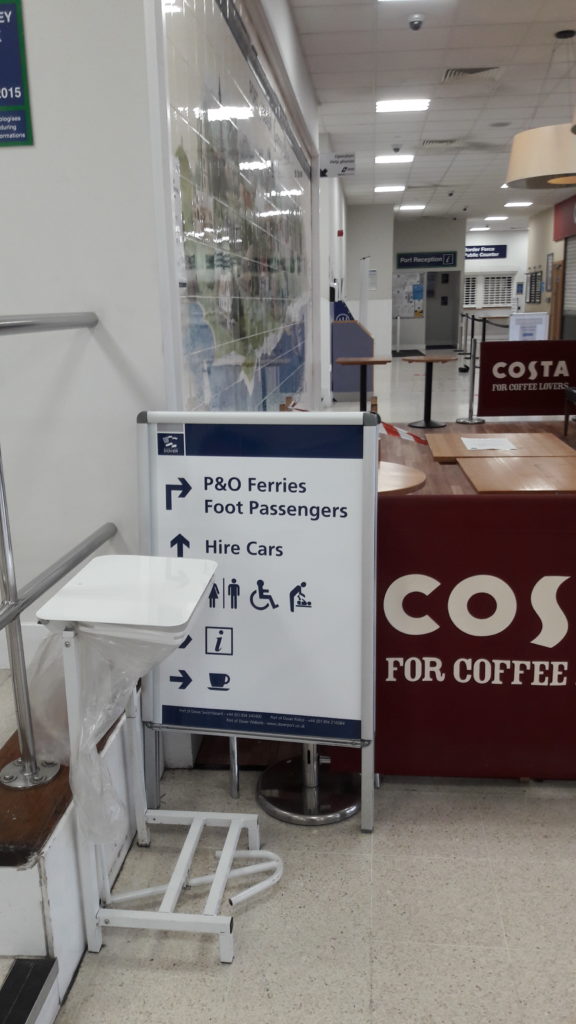
It is for me a surprise and a shock, I didn’t expect what looks very much like a form of border blockade. How to find a car to get through when Flixbus is still suppressed, the London TGV costs 260 Euros and the plane ticket to Paris 300 Euros? While France is right opposite, I could see the Calais coast from the top of the cliff? I leave to seek help from the real authorities – the police. I cross the road crossing and find myself in a pedestrian-free area near the border post where we are usually checked before the ferry when we travel by bus. Some policemen come out and I run to tell them about my misadventure and ask for help. They are friendly. One of the policewomen, sincerely concerned about my situation (it’s raining, it’s cold, I’m a lonely woman stuck in the port with a suitcase who can’t get on my ferry) accompanies me to talk to the man from the port authority. When he sees her there with me he is obliged to be kinder, but he doesn’t give up: « It’s the law, it’s like that because of the covid. No passengers on foot. If she has a bicycle she passes ».
The policewoman is perplexed, but she is visibly powerless. The private transport companies can refuse whoever they want and they are the ones who, as is often the case, decide on absurd pseudo covid prohibitions. I suspect that it is the French government that wants to break the cross-Channel passenger movement and that is why it has banned the cheapest pedestrian crossing. As Macron can’t do it openly, it is evading its bans from private companies who pretend to be the law, like Flixbus, which forces travellers to undergo illegal tests in Berlin, or Ryanair, which is summoned to collect health data on its passengers on behalf of the Polish Sanepid[1].
The English policewoman understands my distress. She offers me either to buy a bike on the spot (so you can pass by and keep the bike, it will be as much as a plane or TGV ticket…) or even to find a car that will take me as a hitch-hiker for the crossing, since the covid leaves cars alone… Why not a truck? Dover is full of Polish trucks and I will eventually find a helpful Polish driver who will help me. That’s an idea. I can remember my first adult trips to Europe – I hitchhiked across Europe several times in 1989, 1990, 1991 and 1992. At that time I was 18, 19, 20 and 21 years old I was a student in Warsaw I had no money to pay for bus tickets, let’s not talk about the plane which was a luxury! So I went to Warsaw-Paris every summer with truck drivers who were already transmitting information to each other via the CB. It was still a very bohemian world, without insecurity. The truck drivers were adventurous french workers who had chosen this profession to move and travel. Some of them had travelled all over the world, on long roads in Asia and Africa, they had things to tell, they were politicised. They took hitch-hikers for conviviality and conversation, so as not to fall asleep at the wheel. And they enjoyed my high-level conversation, while I was always very careful not to let the slightest flirtation settle in, while staying on the quivive. After all, I wanted to live my freedom, but even though I had done karate, I knew that a young lady alone with a man in a truck that serves as a home for the man, it could become dangerous for her. In 1991 I went to Warsaw Paris with my cousin Jeanne and we made the round trip with the same nice truck drivers. And in the summer of 1992 I hitchhiked to France for good, in a context of political and economic crisis, galloping inflation and the destruction of our social life in Poland.
In 2020, in the context of unbridled globalisation, hitch-hiking has almost disappeared and has been replaced by BlablaCar, but not for free. However, the current situation is still changing the situation. I need help, why not give it a try. Back in the central square of Dover I launch an appeal on the Facebook groups of Poles in England. I’m mainly directed to the minibus companies that make the journeys from England to Poland, but they’ve already left. Nobody leaves London before December 17th. My nice Indian cafetier points out a truck car park near the seafront. I walk down a long avenue by the seafront next to some rather expensive hotels that seem to be both open and closed – in fact they have to take in customers but take care that this is not visible from the outside. It’s cold and damp, I’m fed up with this policy that makes us tramps who have to eat and drink outside, who don’t have or go to the toilet, who don’t have or get warm. But this is only the beginning of the ordeal. My friends at Wikijustice are looking for another solution to avoid coming back to London, Calais is just across the Channel, within easy reach. There are other boat companies. But do they accept passengers without bikes? No, all of Dover is blocked. No vehicle, no passage.
I return to the shopping centre in the city centre. What if I buy a bike? But apart from cheap groceries, a clothes shop and a cosmetics drugstore, there is nothing in this small town that smells of desolation and economic stagnation. The vast tourist office in the central square is closed down. Tourists are asked not to come any more, tourism is decreed dead by the Labour municipality. Realising that buying a bike in a town I don’t know is mission impossible, I Google what looks like a large truck car park, where the drivers eat and take their obligatory breaks. I find out about a taxi that agrees to take me there. It’s 10 kilometres away in a business zone upstream from the city.
The man is an elderly local inhabitant, a philosopher. For him, the closure of the Channel to tourist passengers and the « Coronavirian » lockdown is a war waged by the opulent capital against the poor provinces. While London is having fun the regions are asphyxiated and impoverished under a covid pretext. For him there are no sick people in the region, the death toll is a lie, and those who have died had to have other diseases for which they have been very poorly treated since the privatisation of the health system. I say to him again that he is still lucky not to suffer the curfew, the total destruction of social life and the compulsory mask everywhere, including for small children, like us who suffer a lot in France. He listens to my information and wonders aloud if Macron and Johnson did not agree to oppress the little people with their « whore » of a covid… It is a very Yellow Vest opinion, he is moreover admiring of our movement and believes that we need some here…
It is an instructive and enjoyable exchange. For the modest sum of 9 Pounds he takes me to a suburb where I find myself in front of a large fenced car park where hundreds of large trucks are parked. There is a small refreshment bar where the drivers can eat, but I quickly realise that the large gate watched over by cameras and the fence bristling with spikes are more reminiscent of migrant or prisoner detention centres than a friendly stopping place. I am not mistaken. No sooner had I approached the fence than a surly white English came out of a building, ordered me to leave and threatened me with police action if I didn’t obey. He looks like a slave guard, although he is obviously a proletarian himself. I politely explain my situation to him, I just want to talk to a Polish truck driver and ask him to cross with his vehicle. I don’t want to force my way through, I ask him for help. It’s a waste of time. The man shouts at me and orders me to get out of the way, but when I insist, pointing out that I am alone and lost, he tells me to go and see if there are any Polish truck drivers further away who are not parked. Indeed some 200 meters further 3 or 4 trucks are badly parked on the side of the road swept by the winter rain.
They are all Polish. I knock on the door of the first one. A dishevelled man gets up from the back cab and opens the window. I apologise for waking him up and we start talking. He is moved by my situation. A Pole can’t leave a fellow countrywoman alone on the road with a suitcase. He struggles to find a solution for me, calls colleagues. I tell him how the English security guards chased me from the car park to the truckers. He confirms, « It’s a prison, this thing. I avoid going there, there was no more room anyway. I put myself on the side of the road and now I have a 35 pounds fine to pay ». He tells me a little bit about his life, his job. In fact, he comes from Silesia where he is a farmer, he makes up for the family’s income with road transport. « Almost all the truckers who pass through Dover are Polish, and we all transport food products. Without us the English would have nothing to eat. He has not yet been able to deliver his goods to a warehouse 100 km east of London. He’s annoyed, he doesn’t have the assurance that he will be able to deliver today. « The earliest he can deliver is 8pm and I’m back here in the night. And all his colleagues are in his case. I take his phone number and I take my leave. At least I have understood how cross-Channel trade works.
When the TVs show the hundreds of trucks blocked at the port of Dover by Macron’s decision to subject all truckers to the PCR test, when I see Polish truckers invading the highways protesting against the blockade preventing them from resting with their families at Christmas, I will think very highly of him and his colleagues. I hope I have given them words of comfort and perhaps stimulated their revolt a little.
On his advice, I return to the car park getter of the truckers who go out to ask them if they are going to sea. A Czech, Romanians leave the car park – prison, but they are going to deliver. The guard chases me away from the gate again. I start to let go, it’s pitch black, the rain is heavy and my feet are wet and frozen. I risk not the covid, but a severe chill. I decide to call my taxi. But I still have to call an English truck driver for help as my phone is no longer working in the storm that is intensifying. The guard shouts at the truck drivers in the security guard’s uniform and insults me for the third time. The time when I was negotiating my passage through the truckers’ car parks seems as far back as the Neolithic period. Today’s drivers are no longer free to move around, to live their lives, they are forced to do so. Even if I find one who says that the port cops will accept me on board? What if they make me get off and I’ve made all this effort for nothing?
The Polish Sanepid has been, since its foundation by the communist system, an authority controlling the hygiene of products and services and their compliance with standards and laws, such as the General Directorate of Fraud Repression. With the covid dictatorship the Sanepid became the morality and health police and obtained the right to lock people in quarantine and punish them with fines – which is totally illegal and alien to its primary mission and contrary to the Polish Constitution.
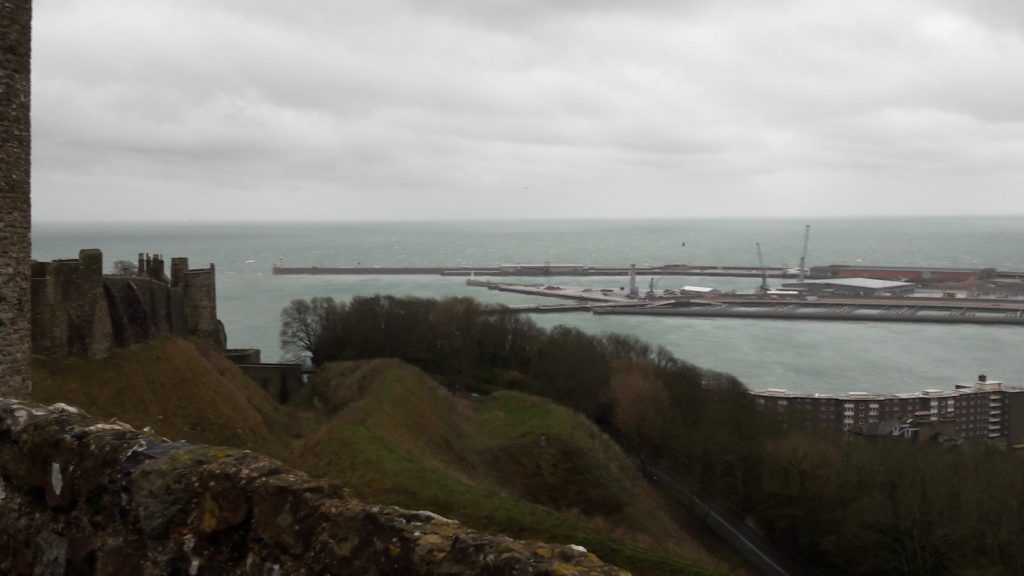
Calais Dover same fight
I am relieved when after 15 long minutes the taxi arrives. I can’t wait to leave, I decide to come back to London. I tell my story to the taxi driver who agrees with me. « Go back to London Madam, I’ll tell you what’s going on ». He is of Indian origin, he is a young man. He usually works a lot with tourists. « It’s a tourist town. I usually go to France all the time. I go to Calais, I bring customers back, they visit the town and the castle, I take them to France. Sometimes I pick up clients at Roissy airport. From the covid they do everything they can to stop people passing by. They ruin the town, the region. We need the passage to France to live. Do you know why they do this to you, forbid pedestrians to take the boat? Because a lot of people from Dover go to work in Calais in the port facilities. Or go shopping or go for a walk. It’s an hour, 45 minutes by boat, they come back and that’s how the town lives. Now it’s dead, there’s nothing, it’s misery ».
He blames the Johnson government for the situation, so incomprehensible is it that the government knowingly decided to kill provinces that were already in bad shape. But he agrees with me that « their covid story is like a secte story, they’ve gone totally crazy with it. They want to kill us by preventing us from living, by forbidding leisure activities, outings, pubs, meetings. It’s inhuman, they want to destroy us ». And yes, it is a policy, because for him there is no disease.
But he advises me not to stay here. « Trying to buy a bike is difficult and they will do everything they can to prevent you from passing by. At the end of the summer I had to take a Frenchman with a bike in a taxi. But they refused his bike in the boat, they said his bag was too big! So the guy had to take the taxi to get through. But it’s going to cost you a lot of money because you pay the taxi on the way there and then also the return of the taxi by boat. It’s not worth it ». Indeed, the powerful of the sect in power do everything to persecute the poor, to ruin them, to plunder them and prevent them from living, even enjoying the air, to mask them, to gag them, to muzzle them, to kill them. To kill them. The world has gone mad.
We agree on this. When the taxi arrives at Dover station, the police are already in ambush. I decide to leave for London. The cops are waiting for who knows what and who on the platform. I don’t want to stagnate, I am relieved when the train arrives. I am forced to take another hotel near Saint Pancrace and return the next day by TGV. The TGV will have cost 220 Euros, I had to ask for help. I also lost a day’s work, which is heavy for me. But Julian Assange’s Freedom, which is also ours, is at this price.
I can’t not at least try to stop the persecution. Trying is believing, having faith. And only action leads to Victory. I must believe in Victory, so I will return as soon as possible for January 4th. In the meantime Wikijustice will have circulated its International Complaint to hundreds of deputies, senators, heads of state and courts of justice in many countries[1].
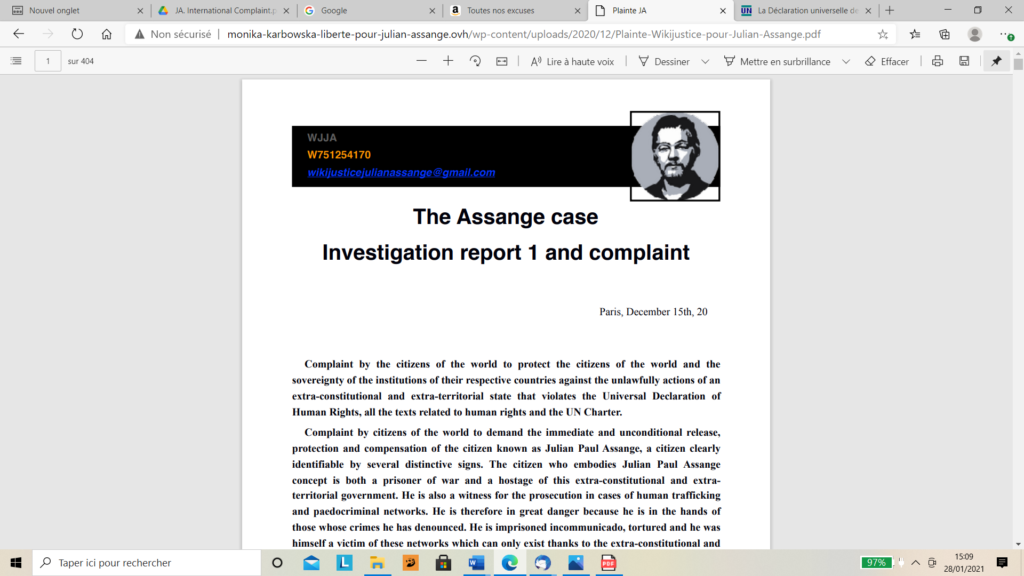
« Dojdiem do Berlina » – « We will arrive in Berlin », this is how Soviet soldiers greeted each other during the war. Our Berlin is to bring down this hidden sect of powerful people who are imprisoning it and oppressing us. « Doszli ». « They have arrived. That was the slogan of Victory.
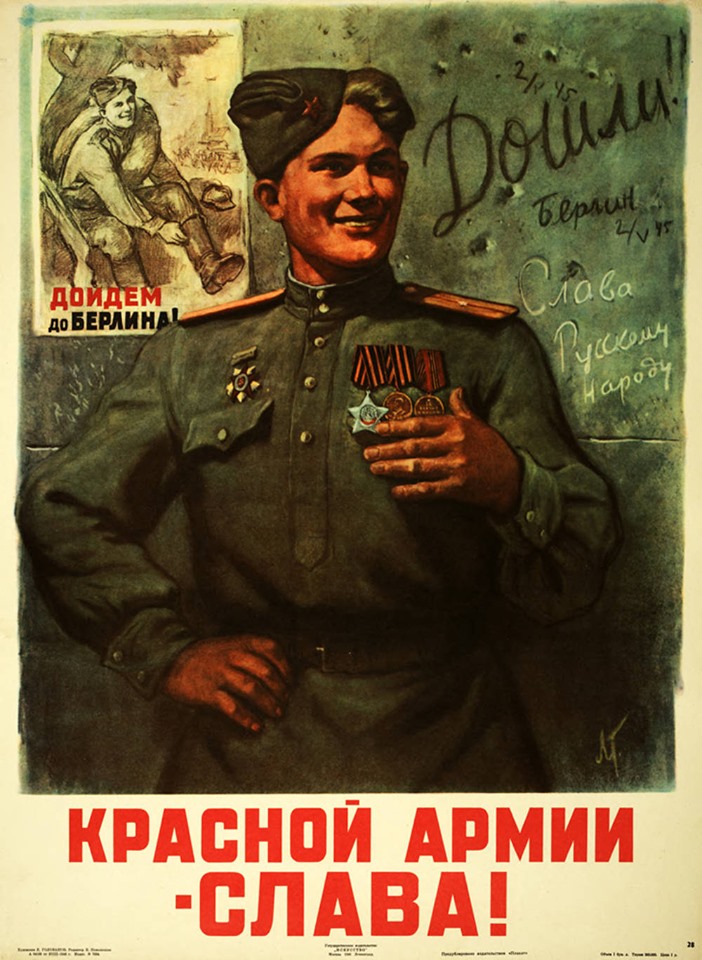
[1] https://drive.google.com/file/d/1rCPKk9vdY29H_kaHjqeClvJtQ62_cw7W/view